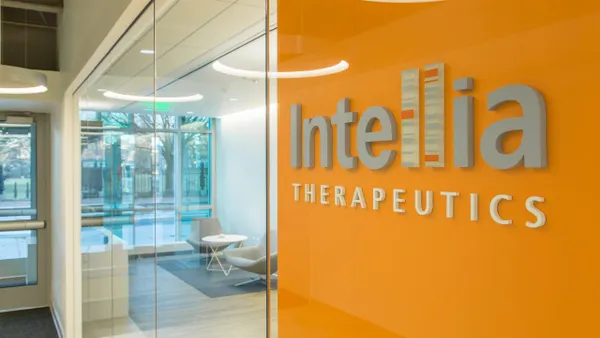Dive Brief:
- A two-drug regimen involving an experimental cancer immunotherapy from iTeos Therapeutics and GSK didn’t significantly delay tumor progression in a Phase 2 trial, leading the companies to end development and terminate the collaboration they formed around the drug four years ago.
- When added to GSK’s drug Jemperli, the immunotherapy, known as belrestotug and aimed at a cellular target called TIGIT, didn’t meet preset criteria for progression-free survival compared to Jemperli alone in people with non-small cell lung cancer. The study showed a “trend below the meaningful threshold” for drug responses in study arms including people with head and neck cancer, the companies said Tuesday.
- Based on the results, iTeos and GSK are stopping all ongoing trials of belrestotug, including an ongoing Phase 3 study in lung cancer. iTeos is “taking immediate steps to preserve capital” as well as starting a strategic review.
Dive Insight:
TIGIT became a top target in the biopharmaceutical industry’s efforts over the past decade to expand cancer immunotherapy. The protein is thought to smother immune responses to cancer, and drugmakers believed that blocking it might amplify the effects of the “checkpoint inhibitors” used to treat dozens of tumors.
That promise sparked a flurry of investment into TIGIT-blocking drugs. Major pharmaceutical companies like Roche, Merck & Co., Bristol Myers Squibb and Gilead Sciences all either developed or acquired prospects. GSK paid iTeos $625 million in guaranteed cash, and promised up to $1.45 billion more, for rights to belrestotug. In a statement at the time, GSK noted how combinations involving the drug and other immunotherapies could “become transformative medicines” for many cancer patients.
Since then, several important studies failed to show that blocking TIGIT can lead to better outcomes, seeding doubt about the target and pushing multiple companies to terminate research. Others continued on, touting early results that met analyst thresholds for success. iTeos and GSK were among them, reporting last year how a combination of belrestotug and Jemperli shrank tumors in roughly twice as many people as Jemperli alone in their Phase 2 study in lung cancer, meeting the trial’s primary objective.
However, the companies didn’t prove those effects would help delay tumor progression. Doing so was a secondary study goal and a key bar for belrestotug to meet for development to continue.
Tuesday’s decision to end testing eliminates iTeos’ most advanced drug prospect as well as the future payouts it could have received from GSK. Given the “current market conditions,” iTeos will now evaluate a range of strategic alternatives to maximize its share value, CEO Michel Detheux said in a statement.
Gilead and Arcus still have a TIGIT-blocking drug in Phase 3 testing in a type of cancer of the gastrointestinal tract. Study results are expected next year.













